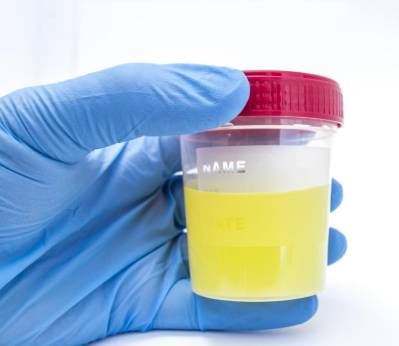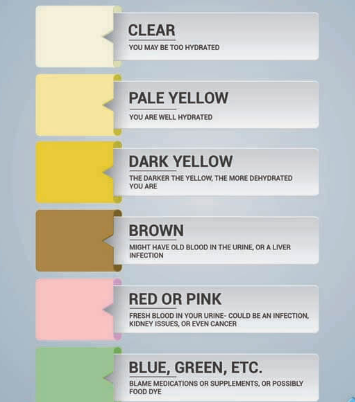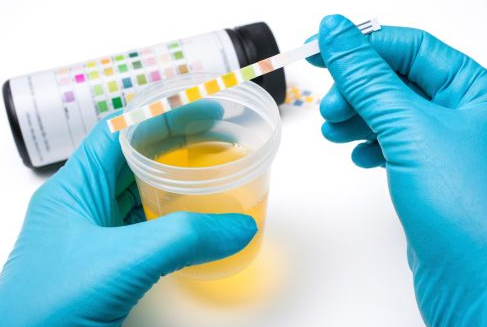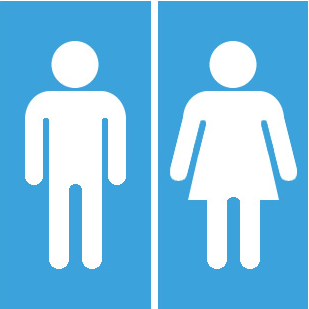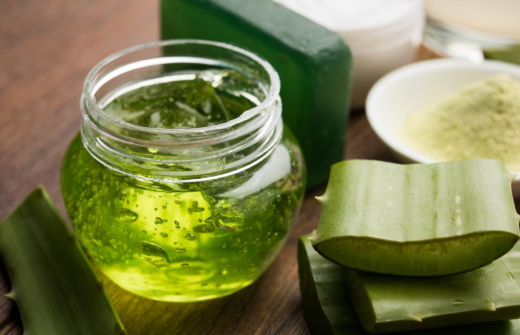Why is my pee bright yellow? Normal urine color usually range from pale yellow to deep amber because of the result of pigments referred to as urochrome and depending on the concentration level of the urine. Pigments and some compounds found in the foods that we eat and medications can result in a change of urine color.
Is it bad when our Urine is Bright Yellow?
What you consumed recently ate can have a hand in the color of your urine. Most of the drugs we acquire over the counter and those prescribed by health care providers produce different urine tones, such as red, greenish blue and yellow color. Consumption of substances like alcohol, caffeine or tobacco can also determine the urine color and concentration as well.
A strange color in the urine can as well signify presence of disease in the body. For example, if you produce a deep red to brown urine you may be suffering from a condition known as porphyria, which is rare, inherited condition of red blood cells.
The normal color of your urine will also vary according to the amount of water you drink. Increased fluid intake dilute the yellow pigment of the urine, and therefore, the more you drink, the clearer your urine looks. If you drink less fluid, your urine will become more concentrated and therefore the color becomes darker in color. Severe dehydration in most cases result in urine that is amber in color.
However, under extreme conditions, urine can change in color far beyond normal, such as blue, red, green, dark brown and even cloudy white.
Bright Yellow Urine Meaning
There are many other factors that affect the color of the urine that one produce.
- Vitamin and mineral content in your diet
Most of the natural foods that we eat such as the berries and beets, and some foods that have been heavily processed may contain increased amounts of food color. The color may interact with some pigments to form a different color in the urine that is far much different.
Some vitamins B are also known to result in urine that has a yellow-green color. If you usually take supplements your urine color may become bright. Also, meal replacement shakes which usually contain some vitamins B may result in the same effect.
Some other food substances such as excess beta carotene or vitamins C may result in dark yellow or orange urine. Beta carotene is usually found in yellow and orange foods, and when absorbed in the body is converted to vitamin A. some of these foods may include carrots and sweet potatoes.
- Intensive Exercises and Working out
During working out, there is a lot of dehydration involved since more water is lost through sweat and therefore less is left to be urinated. This will make the urine to be more concentrated and in this case it will change its color to darker.
Working out that is done without increased drinking of water results in a serious condition that cause muscle breakdown. That is why if you worked out without serious hydration you may develop muscle pain with tea-colored urine.
- Medications
Prescribed medications and over the counter drugs may also have a hand in your bright yellow urine, or a more vivid color. For example, antibiotics, laxatives and some of the chemotherapy medications used to treat cancer are said to cause a great change in color of urine.
Most antibiotic drugs that is used to treat urinary tract infection has effects such as orange-colored urine. The type of color your urine contains may depend on the type of drug you took, and therefore not all drugs will produce same color.
- Diseases
A change in the color of the urine may be a sign of an underlying medical condition in the body. There is several numbers of diseases that affect the normal color of the urine produced. These may include conditions such as liver problems, kidney issues and even bladder infections.
For example, if you produce cloudy urine that contains a foul smell, you may be suffering from either kidney or bladder infections. However, in this case, you may have other symptoms accompanied by the change in color of urine such as painful urination, fever, vomiting, head ache, or abdominal pain.
- Pregnancy
Pregnancy is being connected to the color change of urine by many women although research is still being done on this issue. In most cases women may connect bright yellow urine as one of the early signs of pregnancy. Even in some hospitals the doctor may have a look at the color of the urine before going ahead to test it.
While at home don’t just only depend on the color of the urine as a sign of pregnancy. Find out if there are some other symptoms and if possible let your medical provider contact a real test to come up with correct results on this matter.
Does Bright Yellow Urine Mean no Vitamins
In case you happened to take a daily multivitamin you may have realized that your urine changed the color to bright yellowish color. Vitamins and some asparagus have been known to have an effect on the urine color. Your urine may respond to color change either by turning to a bright, in some cases neon, yellow due to excess riboflavin.
Also known as vitamin B2, riboflavin is a common content that is found in almost all multi-vitamins. The component was first discovered in the year 1872 by a chemist known as Alexander Winter Blyth who noticed a yellow- green pigment in milk.
In the late 1870s it was then reported as lacto-chrome and lacto-flavin. It took a long time up to 1930, when the component that produce a yellow pigment was featured as riboflavin. (The “Flavin” part originate from a Latin word flavus meaning “yellow” or “blonde”)
- Why riboflavin in vitamins give a yellow color
Almost all things that have color have some relations to light absorption. Riboflavin absorbs light strongly in high ranges. When this falls out of the light then we will see with our eyes, it is also riboflavin’s ability to absorb light at 450nm that give it the distinctive yellowish color.
- Why riboflavin turn pee yellow
Studies have revealed that about 50% of all excess riboflavin is excreted through urine. Moreover, the maximum amount of the pigments that may be absorbed in a single dose is around 27mg, with half of it being absorbed in the first one and quarter hours. Therefore if an adult take enough vitamin, this content can be retained and therefore urine will have a nice yellow color.
Therefore, if your vitamin intake is poor, or you have no vitamin, this means that you do not have enough of this pigment in your body and therefore you will produce bright yellow urine.
Is Bright Yellow Urine a Pregnancy Sign?
What color is your urine when you are pregnant? There are some evidences that suggest that pregnancy has a hand in the color of the urine. Some sources reveal that early signs of pregnancy include producing bright yellow urine. However, there are no studies that have been done to support this claim.
For this case if you realized a change in your urine color and doubt pregnancy, you may have to conduct pregnancy test at home or visit a doctor.
Dark Yellow urine meaning
Normal urine color is generally clear and is described as a straw-yellow color. However, urine color might vary in a situation when you consume foods of certain types and when you take certain medications or drugs.
Normally, some substances may also change the color of the urine and potentially may lead to darker urine. These substances may include: food colorings, beets, carotene, blackberries, B complex, laxatives and drugs such as pyridium.
Some condition and infections such as liver diseases, kidney problem and urinary tract infections may cause your urine to appear darker in color. Urine can also appear dark in color as a result of bleeding into the urine. The most common causes of bloody urine can likely infections, cancer, stones, kidney diseases and trauma. These causes can all contribute to a darker appearance of urine.
Some foods may cause your urine to appear dark yellow in color. Some like asparagus makes your urine darker yellow which may be accompanied by a strong odor. If you happen to drink enough water but your still have dark yellow urine color then the condition may be food based.
Some illnesses usually show symptoms such as dark yellow urine color, example Hematuria; blood in the urine, Hemolytic Anemia. Hepatitis also is associated with causing dark urine color and it is usually caused by a viral infection.
Is Bright Yellow Urine UTI Symptom
Urinary tract infection is a very common disease that causes the change in color of the urine. It is the second and most common infection in the body.
The urinary tract of the human being includes many parts of the body. These are your kidneys and bladder. The kidneys play a vital role to remove water and waste from the blood in your body. Water and waste are the contents that combine to form your urine. After the urine has been formed, it travels from the kidneys through ureters which are two small tubes.
This urine is then stored in the bladder where it is held in place by your sphincter muscle to prevent it from running out through the urethra when it is not the right time. When your sphincter muscle relaxes, the urine travels out of your body through the urethra. Bacterial infections can affect the process of urine production, storage and removal.
Normally the urine created in your body is basically sterile and bacteria free. However, bacteria can enter into the body from the skin around you genitals and through your rectum and finally the bacteria climbs up your urethra and into your bladder.
UTI symptoms
You can tell if you have a urinary tract infection by the following signs:
- Feeling pressure in the stomach
- If your urine starts smelling bad, a smell that was not there before
- If you start experiencing fever, fatigue and signs of feeling shaky, this is normally a kidney infection
- If your urine has started having a bright yellow urine in color
- Urine starts becoming cloudy
- Feeling pain and burning when you urinate
Many people take urinary tract infection as a very common infection. This does not mean that it should be ignored either. Visit a doctor immediately if you start experiencing the signs. When this infection is left untreated, it can cause kidney problem which is a big problem to handle. A urinary tract infection in most cases clear up within few days if it is treated with proper medication.
To prevent urinary tract infections, you need to urinate whenever you feel the urge to urinate. Do not hold it for long time as it is not healthy to your body. You should know that the longer you hold it the bladder, the more likely you are giving the chance to bacteria to develop in the bladder.
Bright yellow Urine Liver Problem
One of the most common diseases affecting many people in our society is liver disease. The illness has yet been known to have few recognizable symptoms and it is associated with bright yellow urine. Moreover, liver disease symptoms may commonly appear when the illness has gotten to a higher level in the irreversible stages.
Therefore, to recognize a potential problem associated with the liver through some simple observations is very important. Start observing the color of your urine. This is a good way to alarm yourself that your health in the liver might be at risk.
- Sometime, color of the urine may vary throughout the day. Bright yellow urine could be a good signal that should tell you that your liver is having difficulties to function properly.
- Also, dark urine shows a problem with the liver especially if it is accompanied by stools that are lighter than normal. Generally, light stools and dark urine are one good way of detecting liver diseases.
- Bilirubin, a yellow pigment is formed as a result of the breakdown of dead red blood cells in the liver. Jaundice normally occur when the liver fails to break down bilirubin properly in the body. Jaundice may arise due to reasons like: too many bilirubins trying to enter into the liver at once, damaged liver cannot break down bilirubin, the bilirubin not being able to make it to the digestive tract to be removed through the stool.
Further References:
- Symptoms of dark urine: https://www.healthline.com/symptom/dark-urine
- Dark yellow urine: http://www.urinecolors.com/urine-color/dark-yellow-urine
- what causes bright yellow color in urine and changes in color: https://www.healthline.com/health/bright-yellow-urine
